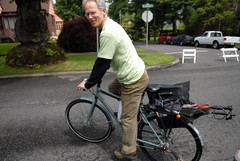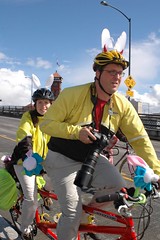“We believe we can catch more flies with honey than we can with vinegar… I don’t think direct action will turn around city council or businesses.”
— Rob Sadowsky, BTA executive director
Back in January, Metro Councilor Rex Burkholder took to a public forum and dropped a pretty hefty insult on the Bicycle Transportation Alliance (BTA). The comment left by Burkholder on a widely read urban planning blog was notable, not just because the level of candor was rare for an elected official (especially in always-nice Portland), but because Burkholder is one of the BTA’s founders.
Burkholder’s opinion came out in the form of a comment on the popular Sightline blog. The blog post was a top ten list of the best things European cities are doing to improve bicycling conditions.
Here are some snips from Burkholder’s comment (emphasis mine):
“Its [sic] a wonder what will happen when you actually make cycling a priority rather than “accommodating” cyclists. In Portland, we have unfortunately stalled and the City, with the acquiescence of the Bicycle Transportation Alliance, are pursuing a separate but unequal strategy of designating side streets as bike boulevards…
… When I helped found and led the BTA in the 1990s, I thought it would take twenty years to get to Dutch cycling levels and preached patience. Well, twenty years have passed and we’re not even close. For example, if I want to ride from downtown to the Hawthorne district, I lose my lane and am encouraged to detour a half mile out of direction to a bike boulevard..
The simple act of turning four lane roads into three lanes with bike lanes would improve travel for everyone, even car traffic but is seen as an insufferable loss by the traffic engineers and the motorists. This is why Minneapolis took our “Best Cycling City” crown away. The Minne Mayor is committed to using the ROW better, not kowtowing to old paradigms.”
The BTA’s Executive Director Rob Sadowsky responded to the comment by pointing out a passage in their 20-year Strategic Plan that calls for half of all Portland arterial streets to have protected bikeways.
Then yesterday, another veteran of Portland’s bike culture posted his thoughts about the current state of the BTA. Ethan Jewett, a marketing consultant and photographer who lives in North Portland, has been biking in Portland since the 1990s (and has been a BTA member all that time). After helping organize Portland’s “BikeSummer” event in 2002, Jewett was one of the founding members of Shift, a loose-knit grassroots organization that promotes “bike fun” and is known for Pedalpalooza, Breakfast on the Bridges, and more.
After a back-and-forth with a BTA staffer on Twitter that led to an email exchange, Jewett posted a lengthy reply on his Facebook page. Here’s the crux of Jewett’s concerns:
“I have serious concerns that the BTA has fallen into the rut of not doing the really hard things… we do need an organization that is willing to go to the mat for whatever constitutes the cycling moonshot. Watching other cities without our biking gravitas build amazing bike-centric projects while we paint bike lanes and put in staples is disheartening at best. We argue over bike amenities on the CRC instead of having bike projects that will once again radically alter the mode split (and thus health and quality of life) for Portlanders…
Oftentimes at non-profits, the obvious truth about performance and relevancy is the 800 lb gorilla in the room that nobody talks about… If warning bells are not going off that the BTA has become a fundraising machine cherry picking safe projects… I’ll at least ring the gong a few times before moving on.”
When asked how he feels about these comments, Sadowsky defended the BTA’s advocacy record.
Sadowsky says he takes his cues from the organization’s recently adopted Strategic Plan and his board of directors: “I feel really good about where the organization is going.”
Sadowsky says when he took over the BTA two years ago, he inherited a “floundering” organization — one that is “just starting to see the fruits” of major structural changes he has put into place.
As for the BTA’s advocacy style, Sadowsky admits they have a quieter approach. While he maintains they’ve, “embraced a mission that doesn’t criticize loudly,” they have also kept the “serious threat of litigation to maintain our rights” as a bargaining chip when working with City officials and other agencies. “I think that’s a stronger threat than bringing 400 people to a rally downtown.”
Summing up the BTA’s advocacy style, Sadowsky added, “We believe we can catch more flies with honey than we can with vinegar.”
Sadowsky says he and Burkholder have sat down and chatted about that Sightline comment (I have not been able to reach Burkholder for comment). “It was an interesting conversation,” Sadowsky said, “He wasn’t aware of the things we were doing… Clearly, we have to do a better job telling our story.”
In Sadowsky’s eyes, that story includes big wins like getting the 2030 Bike Plan adopted and making bike share happen; and heavy-lifting on major policy changes like improved funding for active transportation at ODOT, and turning the tides toward a more bike-friendly Washington County.
When it comes doing bold projects in Portland’s urban core, Sadowsky says the culprit is the lack of federal funding and political will at City Hall — not a lack of influence by the BTA. The method to making big projects happen, in Sadowsky’s opinion, is to build a broad network of partners (including business owners) and then deliver that support to City Hall. “I don’t think direct action will turn around city council or businesses.”
As proof positive of his approach, Sadowsky says to look no further than Chicago, where he worked prior to joining the BTA. That city has been building many miles of physically separated bikeways in their downtown area and Sadowsky says those projects are the fruits of labors he began six years ago. “It takes time, it takes money, it takes energy, it takes sophistication.”
That being said, Sadowsky also acknowledges the need for a more aggressive advocacy group to emerge in Portland:
“The BTA isn’t threatened or afraid of any group approaching us from the more angry/rally model [of advocacy]… There’s room for different voices and styles but we can’t be beating each other up. We really need to be together.”
As for money, Sadowsky doesn’t shy away from admitting they frequently ask for donations. “We are trying to raise money because I want to do more stuff. We know where we need to grow to be able to deliver the things we’re working on.”
In my opinion, there are valid points being made by all parties in this story. Interestingly, one thing we all agree on is that Portland is in a funk when it comes to bicycling. Whether it comes from the BTA, frustrated citizens, a new group, or all of the above, we need to shift the politics and public narrative in this city in order to break through the bike-friendly ceiling we are pressing against. To do that, we need every part of the local bike ecosystem to be healthy. Obviously I have more thoughts on this, but I’ll share them later.
What do you think?




